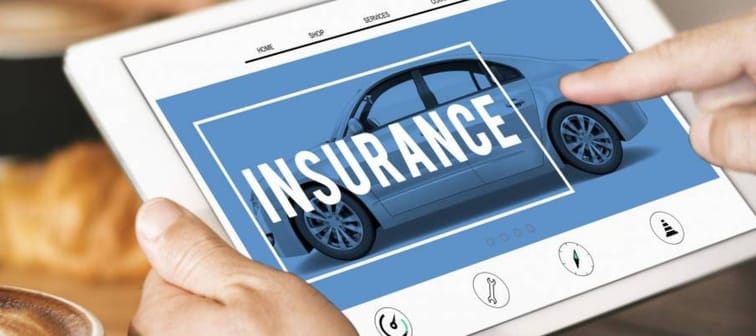7 tips to switch your auto insurance
1. Review your current policy
Putting your auto insurance on automatic renewal is convenient. But it doesn't mean you shouldn't review your policy when it's time to renew. Before you switch your car insurance, review your current coverage and rate.
Double-check your deductibles (what you have to pay out of pocket for repairs before your insurance kicks in), the amount of collision and/or comprehensive coverage that you have, and what discounts you're getting.
These details will be available on your information or declarations page at the front of your policy paperwork, or on a coverage summary tab when you log in to your insurer's website.
More: Does your job title affect your car insurance rate?
2. Shop around for the best rate
With so many national and regional auto insurance companies out there, the internet is your auto insurance research friend.
Visit insurers’ websites and answer a few simple questions about your car, your location and your driving record to get an initial quote. Take a look at the discounts offered by each company, because those can vary. You can also use an insurance comparison site to quickly collect quotes from multiple companies. For instance, SmartFinancial offers a break from the frustration people typically have to go through to get auto insurance quotes.
Remember, the lowest rate isn't always the best rate.
If it's looking pretty clear that your insurance carrier isn't competitive, make a list of your top alternatives. And don’t be afraid to go with a smaller insurer if they have a good rate.
3. Call your current insurer for a better deal
Once you’ve had a look at your current coverage and have comparison-shopped and tracked down a better price, call your insurance company directly.
Tell them you've been a good customer (if that's true) but have found the same coverage for a lower rate with one of their competitors. Make it clear that you're thinking about making a switch.
Customer retention is a big deal for insurers, and many will fight to hold on to your business. They likely will review your account, see if you qualify for additional discounts and may try to match or even beat a rival’s quote.
4. Ask about fees
If your insurance company won't budge but you're still ready to leave, make sure there aren't any fees that come with switching.
Some insurers charge a penalty for switching before the end of your coverage term. You may have to pay 10% of your unused premium or a fixed fee of $30 to $50 if you cancel in the middle of your term.
Other auto insurance companies allow you to cancel at any time if you give proper notice. Ask your insurer if there's a cancellation penalty, then decide if it makes sense to switch now or in a few weeks or months.
5. Read company reviews
A car insurance policy may look good at a glance, but the fine print can be a killer. Before you sign on to a new policy with another insurance company, make sure you go over it thoroughly.
And, check online customer reviews and the insurer's Better Business Bureau ratings to see if there are issues with claims payments and service.
Some companies are more likely to put the client at fault for an accident, take a long time to process and pay a claim, or pay the incorrect amount. For the sake of your wallet and your sanity, don’t sign up with a company if its service is no good.
6. Avoid a gap in your coverage
Whenever you switch insurers, always be absolutely certain you have continuous coverage. If there's any gap in your coverage and you get into an accident, you could be on the hook to pay all of the costs on your own.
And once you've gone without insurance — even for just a couple of days — insurance companies may charge you more in the future.
So, before you change carriers, make sure you have documentation of and double-check the date the new policy goes into effect. And don't allow your old policy to expire until the new one is in force.
7. Cancel your existing policy - and get confirmation
Cancel your old policy carefully. Whatever you do, don't just stop paying your premium, because the insurer could report you to the credit bureaus as a deadbeat.
Notify the company that you are ending your relationship and are going with a different provider. Ask for written confirmation, including the final date that your policy is in effect.
This document can help you dispute any additional accidental billing and will ensure that your credit is protected.
More: How to check your credit score for free
Stop overpaying for home insurance
Home insurance is an essential expense – one that can often be pricey. You can lower your monthly recurring expenses by finding a more economical alternative for home insurance.
SmartFinancial can help you do just that. SmartFinancial’s online marketplace of vetted home insurance providers allows you to quickly shop around for rates from the country’s top insurance companies, and ensure you’re paying the lowest price possible for your home insurance.
Explore better ratesDrive safe to keep your great rate!
For the first 90 days of your new policy, you’re effectively on probation.
If you file a claim, get a ticket or cause an accident during those early days, the laws make it easy for the insurance company to cancel your coverage and send you looking for a new carrier. And finding one will be tougher once you've been dropped.
So, be extra careful behind the wheel — to make a good first impression.
Sponsored
Unexpected vet bills don’t have to break the bank
Life with pets is unpredictable, but there are ways to prepare for the unexpected.
Embrace Pet Insurance offers coverage for treatment of accidents, illnesses, prescriptions drugs, emergency care and more.
Plus, their optional wellness plan covers things like routine vet trips, grooming and training costs, if you want to give your pet the all-star treatment while you protect your bank account.






